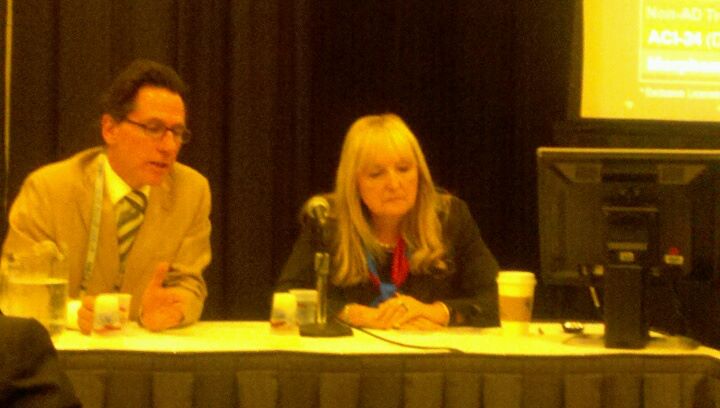Massachusetts to collaborate with innovation regions in Medicon Valley, Skandinavia, and Catalonia, in Spain
Governor Deval Patrick and Medicon Valley Officials after signing collaboration agreement at 2012 Bio International Convention on 6/20/12. Photo by Anita Harris, Harris Communications Group.
“It’s not about what we can give you or take; it’s about how we can share.” So said Massachusetts Governor Deval Patrick before signing a collaboration agreement with officials from Medicon Valley MOU –located in the Capital Region of Denmark, Region Zealand in Denmark and Region Skåne in Sweden. The agreement was one of two partnerships signed today between Massachusetts and European regions. The second was with Catalonia, Spain. Both agreements were signed at the BIO International Convention.
“Our innovation economy is thriving here in Massachusetts and establishing and encouraging international partnerships is an important part of our future growth,” Governor Patrick said. “Catalonia and Medicon Valley are important regions in Europe’s innovation sector, and these partnerships will allow us to move forward on our mutual goals in this part of the global economy.”
The Medicon Valley memo of understanding (MOU) was signed by Governor Patrick and officials from the Capital Region of Denmark, Region Zealand in Denmark and Region Skåne in Sweden.
The agreement focuses on enhancing research partnerships in life sciences by an exchange of researchers and students; identifying special projects, partnerships or collaborations that can lead to new or enhanced research opportunities; and establishing a framework to be used in joint projects that could be financed by the European Union or National Institute of Health to develop new products and processes that can be used in the global market, according to a press release furnished by the governor’s office.
Medicon Valley is a bi-national region composed of the island of Zealand in eastern Denmark and the Skåne region of southern Sweden. It is home to over 200 companies in biotech, med-tech, and pharmaceuticals with over 350 additional companies in those fields having affiliate or branch offices in the region. These industries employ 40,000 people.
The MOU with Catalonia, Spain was signed by Governor Patrick and the President of Catalonia, Spain Artur Mas I Gavarro, with U.S. Ambassador to Spain Alan Solomont present for the signing. The Patrick-Murray Administration has partnered with the Catalan Government to put real collaboration into a renewed agreement on the 20th anniversary of Lieutenant Governor Paul Cellucci signing a Declaration of Intent of Cooperation in 1992 between Massachusetts and Catalonia, according to the release.
The agreement facilitates collaboration in the following areas:
a) Bilateral cooperation in research, and technological and industrial innovation;
b) Business cooperation and economic development in key productive sectors, especially in life sciences, renewable energy, information technology, advanced manufacturing and infrastructure, and;
c) Academic cooperation.
Catalonia has pursued a policy similar to Governor Patrick’s of investing in the innovation economy. Areas of convergence include the life sciences, mobile devices, clean energy technology, and advanced infrastructure. In 2011, Spain was Massachusetts’ 21st largest export partner, with Massachusetts exporting approximately $326.99 million worth of goods and services.
The BIO International Convention provides Governor Patrick, Lieutenant Governor Timothy Murray, state and industry leaders with an opportunity to showcase Massachusetts as a global leader in the life sciences industry, and the preeminent place for life sciences companies to invest in and expand. On Tuesday, Governor Patrick announced the first round of grants awarded under the Massachusetts-Israel Innovation Partnership (MIIP). MIIP is a formal collaboration between the State of Israel and the Commonwealth of Massachusetts to encourage and support innovation and entrepreneurship between Massachusetts’ and Israel’s life sciences, clean energy and technology sectors. A total of at least $1.3 million is being awarded to four research & development (R&D) collaborations between Massachusetts and Israeli companies that have been jointly approved by the funding agencies on both sides. The total budget of the awarded projects is estimated at approximately $3 million. The Massachusetts awardees are located in Natick, Needham, North Billerica and Wilbraham.
Earlier on Wednesday, the Governor joined seven global biopharmaceutical companies to announce the formation of the Massachusetts Neuroscience Consortium. Participating companies include Abbott, Biogen Idec, EMD Serono, Janssen Research & Development, LLC, Merck, Pfizer and Sunovion Pharmaceuticals Inc. The Consortium will fund pre-clinical neuroscience at Massachusetts academic and research institutions.
Governor Patrick’s ten-year, $1 billion life sciences investment package has strengthened the state’s global leadership in the life sciences. The initiative melds all of the state’s key resources in order to spur research, investment, innovation and commercialization. Now the life sciences industry in Massachusetts is thriving, with more than 52 percent job growth in the biopharma sector since 2001 and more than 80,000 employees working in the life sciences.
–Anita M. Harris
New Cambridge Observer is a publication of the Harris Communications Group, an award-winning public relations and marketing communications agency located in Cambridge, MA.
###












